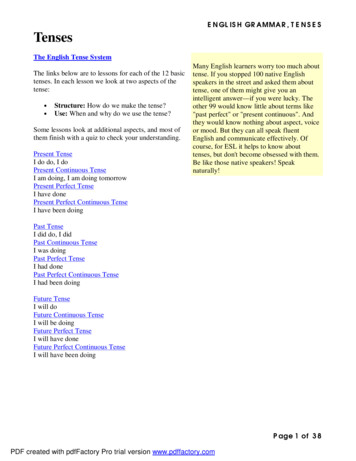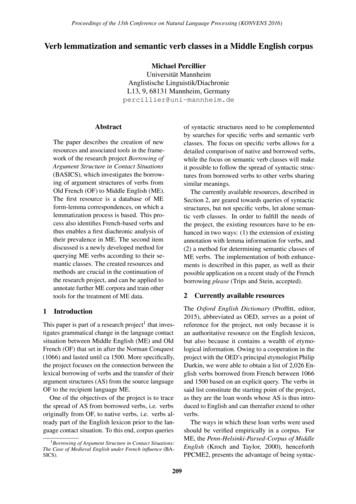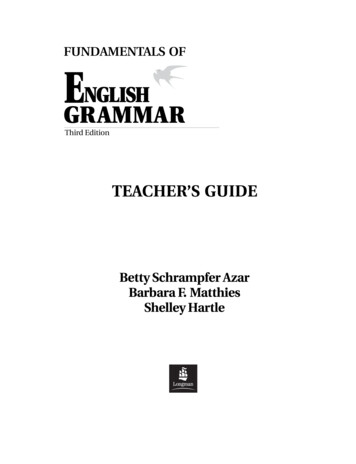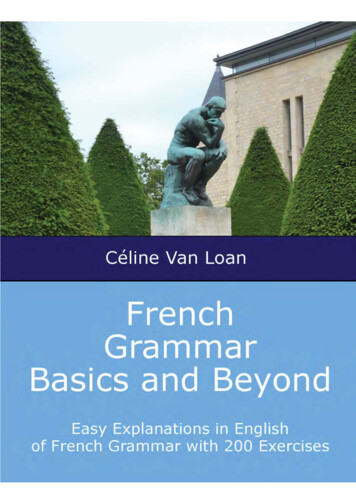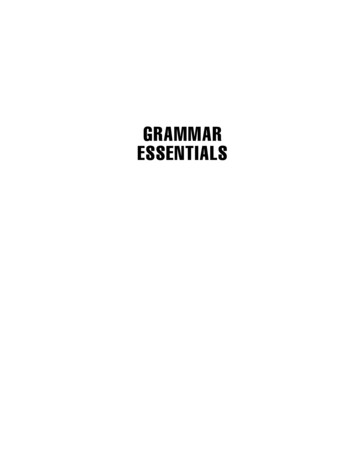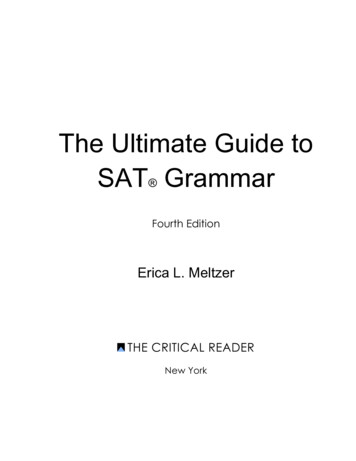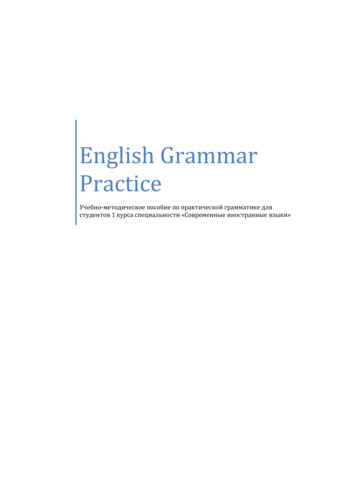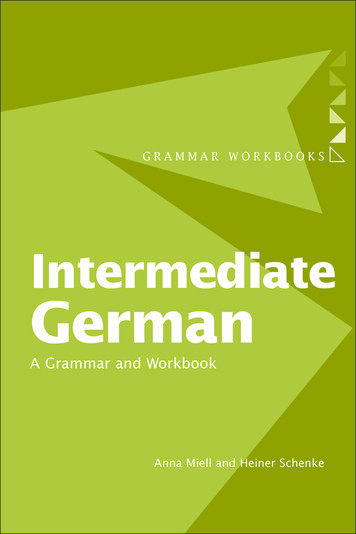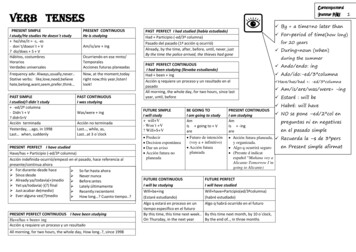
Transcription
CarmenquemoralGrammar PAU 1Verb tensesPRESENT SIMPLEI study/He studies He doesn t study he/she/it -s, -es- don t/doesn t V? do/does S VHábitos, costumbresHorariosVerdades universalesPRESENT CONTINUOUSHe is studyingFrequency adv: Always,usually,never.Stative verbs: ,think Now, at the moment,todayright now,this year,listen!look!PAST SIMPLEI studied/I didn t study -ed/2º columna- Didn t V? did S VAcción terminadaYesterday, ago, in 1998Last when, suddenlyAm/is/are ingOcurriendo en ese mnto/TemporalesAcciones futuras planeadasPAST CONTINUOUSI was studyingWas/were ingAcción no terminadaLast , while, as,Last at 3 o clockPRESENT PERFECT I have studiedHave/has Participio (-ed/3ª columna)Acción indefinida-ocurrió/empezó en el pasado, hace referencia alpresente/continua ahora For:durante-desde hace So far:hasta ahora Since:desde Never:nunca Already:ya/todavía( )medio Before:antes Yet:ya/todavía(-)(?) final Lately:últimamente Just:acabar de(medio) Recently:recientemt Ever:alguna vez(?)medio How long ? Cuanto tiempo.?PRESENT PERFECT CONTINUOUS I have been studyingHave/has been ingAcción q requiere un proceso y un resultadoAll morning, for two hours, the whole day, How long.?, since 1998 By a time no later thanPAST PERFECT I had studied (había estudiado)Had Participio (-ed/3ª columna)Pasado del pasado (1ª acción q ocurrió)Already, by the time, after, before, until, never, justBy the time the police arrived, the thieves had gone For period of time(how long)PAST PERFECT CONTINUOUSI had been studying (llevaba estudiando)Had been ingAcción q requiere un proceso y un resultado en elpasadoAll morning, the whole day, for two hours, since lastyear, until, before Ando/endo: ingfor 20 years During noun (when)during the summer Ado/ido:-ed/3ªcolumna Have/has/had : -ed/3ªcolumna Am/is/are/was/were -ing Estaré : will be Habré: will haveFUTURE SIMPLEI will study will V- Won t V? Will S VBE GOING TOI am going to studyAmIs going to VarePRESENT CONTINUOUSI am studyingAmIs -ingare Predecir Decision espontánea Dar un aviso Acción futura noplaneada Futuro de intención(voy a infinitivo) Acción futuraplaneada Acción futura planeada, Recuerda la –s de 3ªpersy organizada.en Present simple afirmat Algo q ocurrirá seguro (Presnte d indicatespañol “Mañana voy aAlicante-Tomorrow I mgoing to Alicante)FUTURE CONTINUOUSI will be studyingWill be ing(Estaré estudiando)Algo q estará en proceso en untiempo específico en el futuroBy this time, this time next week.On Thursday, in the next yearFUTURE PERFECTI will have studiedWill have Partcipio(ed/3ªcolumna)(habré estudiado)Algo q habrá ocurrido en el futuroBy this time next month, by 10 o clock,By the end of., in three months NO se pone –ed/2ªcol enpreguntas ni en negativasen el pasado simple
CarmenquemoralGrammar PAU 2C O N D I T I O N A L SIf present simple , will infinUnless(if not)modalimperativepresent simple1ST TYPE( si estudias )probable2ND TYPE(si estudiases )Improbable3RD TYPE(Si hubieses estudiado )Imposible ( past)If Past simple , would infinitivecouldmightIf past perfect, would have Participiocould havemight haveW I S H / if onlyIf I see Ann, I ll invite herIf you don t finish your homework, you can t go outIf they see you, runIf I am late, my parents worryIf I worked harder, I d get better marksIf I had a lot of money, I could have my own airplaneIf she worked harder, she might have a better jobIf I had caught the bus, I would have been in timea Wish Desearía- Gustaría I wish Ojalá If Only Ojalá – Si al menos.Wish / If only Past SimpleSituaciones presentes quequisiéramos cambiar/mejorarHe wishes her house were biggerWish / If only Past PerfectWish / If only CouldWould InfinHechos pasados lamentando loocurridoDeseos sobre situacionesfuturas, indicando q es pocoprobable q ocurranI wish I had studied hard at school (Ojalá q hubiera estudiado mas .If only I lived near the schoolIf only she would call me more oftenOraciones temporalesSe forman como las de 1st conditional : Present simple , future simple . Lo que cambian son las conjunciones : as son as , by the time , when ,the moment (that) , as long as , etc.I will phone you as soon as I arrive home
P A S I V ECarmenquemoralGrammar PAU 3V O I C ETEN EN CUENTA QUE TheygaveDianaSUJETO VERBO OI a camera last weekOD CCSUJETO (OI) BE PARTICIPIO OD CC (BY SUJETO)Dianawas givena camera last weekSUJETO (OD) BE PARTIC.A camerawas given OI CC (BY SUJ) Al poner en pasiva una frase afirmativa cuenta el número depalabras que tiene el verbo en activa. En pasiva tiene quehaber una más. Al poner en pasiva una frase interrogativa debes empezarpor el auxiliar.Are they preparing the meal? Is the meal being prepared? Si la pasiva es negativa, “ not” va con el primer auxiliarThey are not making the meal.The meal is not being preparedto Diana last weekNormalmente verás: Have/has/had been participio Can,must,could,may,will be participio Is/are/am/was/were been participio Presente: is/am/are participioTRANSFORMACIÓN ACTIVA-PASIVA1.Identificar el objeto de la activa(OD/OI)2.Lo ponemos de sujeto de la pasiva3.Identificamos el tiempo del verbo.4.Ponemos “to be” en el mismo tiempo Past Participle (3ª column /-ed) del verbo5.Ponemos el sujeto de la activa como agente de la pasiva precedido por “by”HAVE / GETIt is said that. / He is said to.Con verbos comoSOMETHINGCuando alguien hace las cosas x nosotros, ej “cortar el pelo,pintar un piso, etc.believed, thought, expected, said, estimate, known, considered, reported Have/get objectla pasiva se hace de dos formas:“Experts expect that the Chinese economy will grow”1. “The Chinese economy is expected to grow”2. “It is expected that the Chinese economy will grow”DONE(my room, my hair, .) Participio (-ed/3ªc)En cualquier tiempo I m having, I ve had, I ll have I m having my house painted (Me están pintando la casa) When are you going to have your hair cut? (¿Cuándo te vasa cortar el pelo?)
REPORTEDTenseDIRECT SPEECHPast simple workedPresent continuousPast continuousAm/are/is workingPast simple workedSPEECHINDIRECT SPEECHPresent simple worksWas/were workingPast perfect had workedPast continuousPast perfect continuousPresent perfecthave/ has workedPast perfectPresent perfectcontinuousPresent perfect continuousPast perfect simplePast perfect simplePast perfect continuousPast perfect continuousFuture simple will workWould infin would workWas/were workinghave/has been workinghad workedhad been working?CarmenquemoralGrammar PAU 4had been workinghad workedhad been workinghad workedDIRECTcanMayHave toMustINDIRECTCouldMightHad toHad toLos verbos más usados en elestilo indirecto son: , - : said, told, added,explained, begged, promised,offered, replied, declared,stated ? : asked, wondered, wantedto know, inquired Commands: told, ordered,askedhad been working ¿Yes/no questions Did you speak to Mary yesterday? She askedask if/whether S V She asked if/whether I had spoken to Mary ¿ Wh-questionsWho are you writing to? She askedask wh- S V She asked who I was writing toiNowThenTodayThat dayTonightThat nightYesterdayThe previous day / the day beforeLast weekThe previous week / the week beforeA month agoThe previous month / the month beforeTomorrowThe following day / the next day / the day afterNext weekThe following week / the week afterHereThereThisThatTheseThosehOrders . “Stop driving so fast” “Don t tell anybody”Reported verb:order,warn,advise Compl.Indirect (not)to infinitive“My mother ordered me to stop driving so fast”“He begged me not to tell anybody”Suggestions Sujeto suggest lo sugerido that suj verbo en infinitivoLet s watch the news, Tom suggested Tom suggested that we watch the news Gerundio -ing sin especificar el sujeto Let s phone the police inmediately He suggested phoning the police inmediately
CarmenquemoralGrammar PAU 5Pron. Relat Verbo NO se puede omitirPron. Relat Suj Verbo SIDEFINING RELATIVE CLAUSES Información esencial para la comprensión de la frase Los pronombres who, which y that pueden omitirse si no hacen de sujetox(El sujeto de la frase y el sujeto de la frase de relativo sean diferentes)The man (who) we met at the bus stop told me the truth( The man who visited us yesterday is a professor NO se puede omitir)Suj de la oración d relativoSuj de la oración d relativoWhose no se puede sustituir Si el relativo lleva preposición, lo mas común es omitirlo y poner la prepos. detrás del verbo.The boy (who/that) I talked to was nervousNON DEFINING RELATIVE CLAUSES Siempre va entre comas La información es extra, no es esencial para entender la frase. El relativo NO se puede omitir No se usa thatToo easy for me,teacherIPRONOMBRES RELATIVOSWhich & that cosas/animalesWho & that personasWhose (cuyo) posesión Nunca es sujeto- no se puede omitirADVERBIOS RELATIVOSWhen & that un momento en el tiempoWhere lugares (no suele omitirse/ no se sustituye x that)b
CarmenquemoralGrammar PAU 6USEOBLIGATIONMODAL Musttengo la obligación de,#debo, tengo que Have to (no modal: has to)NECESSITYNO OBLIGATIONNo hace falta quePROHIBITIONSe, puedo, soy capazPOSSIBILITYDEDUCTION/CERTAINTYI must finish this exerciseTen en cuenta que Must y have to tienen un significado similar (obligación,debo, tengo que); aunque Need to (no modal)( )She needs to speak to you Needn t Don t have to(no modal) Mustn tYou needn t come if you don t want toYou mustn t smoke at school Mustn t indica prohibición (no puedes) y Can (presente) Could (pasado) Be able to-todos los tiempos May (puede que) Might (pudiera ser que)(posib remota) Could (puede que) Must (I m sure)I can play the pianoI could climb mountainsI will be able to drive a bus Don t have to no obligación (no hace falta que)no puedesABILITYEXAMPLEThey have to wear a uniform Can t (It s imposible) must solo se usa en presente y * have to en los d tiempospero Mustn t y don t have to tienen un significado muyYou don t have to come if you don t want toThey may begin acting like criminalsHe might comeThey could be on the train nowThat must be your mother(esa debe ser tu madre)That can t be true(eso no puede ser verdad)MODALES PERFECTOSdiferente: Need to no es modal; se usa en afirmativa igual q have toy expresa obligación y necesidad Needn t si es modal y expresa no obligación(no hace faltaq) igual q don t have to(Cuando un verbo no es modal quiere decir que se conjuga,es decir lleva –s de 3ª pers., necesita aux do/does para ?,-, etc) Would , (?) se usa para pedir a alguien q haga algoMust have PPAlgo casi seguro q pasó/conclusión lógicaMay/might have PP Para hacer una suposición sobre algo pasadoCould have PPSe pudo hacer algo pero no se hizoCouldn t have PPCerteza de que algo no ocurrióSe quiso haber hecho algo pero no se pudo debido a causas externasWould have PPMary didn t come yesterday. She must have been illShe may have forgotten our meetingI could have gone with her, but I decided to stay homeShe really loved him. She couldn t have broken up with himI would have passed English in June, but I didn t study hardShould have PPShouldn t have PPNeedn t have PPYou should(ought to) have told them we aren t going out todayI shouldn t have drunk so much, I can t go home nowI was going to make dinner. You needn t have made itNos lamentamos de lo ocurrido y de q no haya pasado lo q queríamosCritica un hecho pasado indicando q no debería haber ocurridoNo había necesidad d hacer lo q se hizo
CarmenquemoralGrammar PAU edir algoImposibilidadI can drive a busCan I go to the toilet?She can come to the partyCan you lend me some moneyI can t lift this boxDeducciónThose can t be my keys. I ve got themHabilidad en el pasadoI could play the guitar when I was fivePreguntar formalmenteCould you tell me the time, please?EspecularWhose could these glasses be?SugerirWe could go to the theatreImposibilidad en el pasadoI couldn t ride a bike when I was fiveHabilidadI will be able to pass this subjectMay / MightPosibilidadIt might rain tomorrowMayPedir algo educadamenteMay I borrow your book, please?WouldPedir algo formalmenteWould you come with me to the wedding?Ofrecer (con like)Would you like some tea?Hábitos en pasado(used to)She would tell us storiesObligación,You must be quiet in the libraryDeducciónJohn must be very busy. He didn t comeHave toObligaciónI have to study hard if I want to passNeed toObligaciónI need to buy some meat for dinnerNeedn tNo obligaciónYou needn t do all the exercisesDon t have toNo obligaciónWe don t have to attend the conferenceMustn tProhibiciónYou mustn t step on the grassShould /ought toConsejo , opiniónYou should tell the truthCanCan tCouldCouldn tBe able toMustSHOULD / HAD BETTER ( d better)Should se usa para dar un consejo, una opiniónHad better es otra forma muy coloquial de expresar lo mismo.También expresa advertencia: Será mejor que , Más vale que Suj d better verbo en forma base es mejor que subjuntivoYou d better see the doctor (es mejor que veas al médico)- Suj d better not verbo en forma baseYou d better not go out in the rain(es mejor q no salgas con la lluv)VERBS ADJECTIVES Verbs adverbios de modo (describen la acción)He sings badly. They run fast Verbos adjectives los q se refieren a estados o percepcionessmell good/badtaste saltyseem tiredfeel emotionallook adjective & look like noun (parecer)Look as if sentence (parece como si .)Look ing (gustar en gral)Feel like ing (apetecer)
InfinitiveGERUND Como sujeto (hechos en gral)Smoking is harmful Después de preposicionesHe is interested in doing Pilates Después de go sportHe went swimming yesterday Después de ciertas expresionesIt s worth (merece la pena)There is no point in It s no use in (no vale la pena) Después de verbos d preferencialove, like, dislike, h
If I had caught the bus, I would have been in time W I S H / if only a Wish / If only Past Simple Situaciones presentes que quisiéramos cambiar/mejorar He wishes her house were bigger If only I lived near the school Wish / If only Past Perfect Hechos pasados lamentando lo ocurrido
